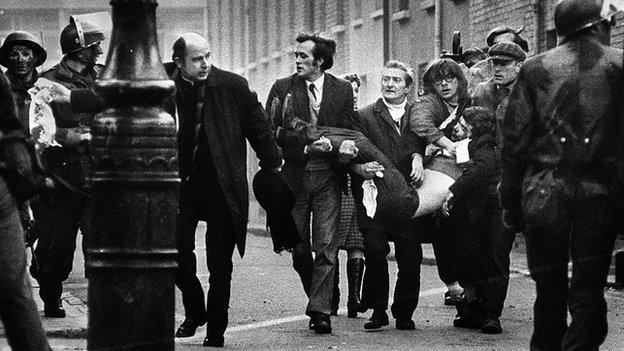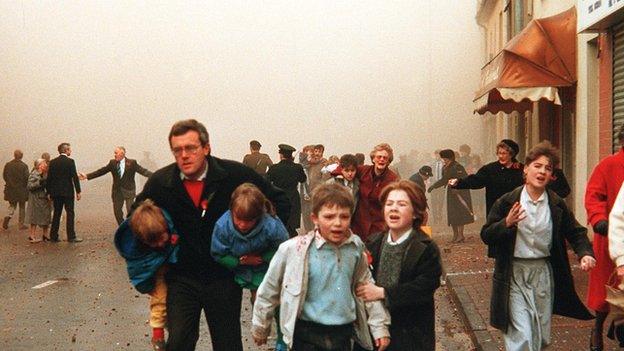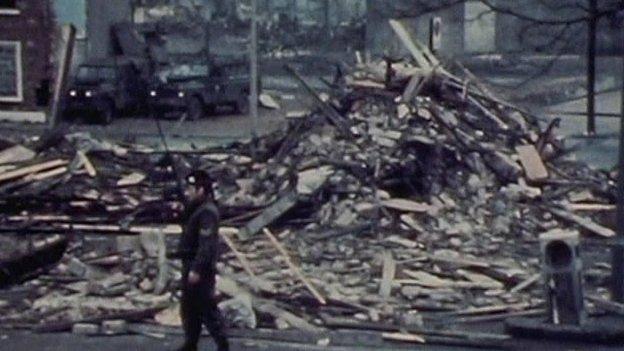Victims condemn Northern Ireland Troubles prosecutions call
- Published

One of the victims of the 1972 Bloody Sunday shootings in Londonderry is carried away. Thirteen people were shot dead by British soldiers, while a 14th died months later

Eleven people were killed and 63 injured when an IRA bomb exploded at the cenotaph in Enniskillen on Remembrance Day in 1987

The remains of McGurk's bar in north Belfast. Fifteen people were killed in the loyalist bomb attack in 1971
Northern Ireland victims groups have criticised a suggestion that there should be an end to prosecutions for Troubles killings.
NI's Attorney General John Larkin said there should be an end to investigations into killings before the 1998 Good Friday Agreement.
Prime Minister David Cameron said such a move would be "rather dangerous".
None of Northern Ireland's main political parties have supported the idea.
Mr Larkin had said there should be no further police investigations, inquests or inquiries into any relevant killings that took place before the signing of the Good Friday Agreement in 1998.
NI attorney general John Larkin calls for end to Troubles prosecutions
That means all deaths caused by paramilitaries, police or the Army.
Mr Larkin said his proposal was not a formal amnesty, but was a logical consequence of the agreement.
His comments came as former US diplomat Richard Haass tries to broker a political agreement over how to deal with the legacy of Northern Ireland's past, as well as controversial parades and the flying of flags.
Relatives of Troubles victims have criticised Mr Larkin's suggestion.
Patrick Corrigan from Amnesty International called Mr Larkin's proposals "an utter betrayal of victims' fundamental right to access justice".
Stephen Gault, whose father Samuel was killed in the 1987 IRA Poppy Day bombing in Enniskillen, said: "How dare he airbrush the innocent people who were murdered at the hands of terrorists to move things forward. I just think it's totally disgusting."
Kate Nash, whose brother was shot dead by the Army on Bloody Sunday in 1972, said: "I'm absolutely incensed by what the attorney general is saying - my brother didn't matter, my brother was murdered almost 42 years ago."
'Rather dangerous'
Speaking during Prime Minister's Questions, Mr Cameron said: "We are all democrats who believe in the rule of law, who believe in the independence of the police and prosecuting authorities, and they should if they are able to, be able to bring cases.
"I think it's rather dangerous to think that you can put some sort of block on that.
"But of course we are all interested in ways in which people can reconcile and come to terms with the bloody past, so that they can build a viable future and a shared future for Northern Ireland."
Northern Ireland's Justice Minister David Ford said: "I don't agree at all with the suggestion made by the attorney general that the criminal justice system should no longer have a role in dealing with the past.
"We need a process that includes justice, truth and reconciliation - I don't believe that we will get any one of these without the other."
The Democratic Unionist Party (DUP), the largest political party in Northern Ireland, said the attorney general had not consulted the Stormont Executive about his proposals before making them public.
The party's Jeffery Donaldson said: "There is no nation in the free world today where murder is not a crime, you cannot say that murder is not a crime - it is.
Nigel Dodds says there should be "no question" of amnesty for terrorists
"There are 3,000 unsolved murders in Northern Ireland and those families are entitled to the right to pursue justice."
'Cause of real concern'
Sinn Féin's Gerry Kelly said: "There's many different views of what you do with the truth or post-truth, but the one thing that we've all agreed to, is the truth needs to get out.
"Now if what John Larkin is doing is drawing a line in the sand and closing down the ability to bring out truth, then I would fundamentally disagree."
The nationalist Social Democratic and Labour Party (SDLP) said the attorney general's remarks were a "cause of real concern".
SDLP justice spokesperson Alban Maginness said victims and survivors of state and paramilitary violence were "entitled to justice irrespective of the lapse of time".
Ulster Unionist leader Mike Nesbitt said he was deeply suspicious about the timing of Mr Larkin's comments.
"I am shocked at the lack of consultation particularly with victims, never mind the executive," he said. "I can't believe he didn't understand the hurt and pain he would cause amongst victims."
Traditional Unionist Voice leader Jim Allister said he was "appalled and angry" at the attorney general's proposal.
"Murder is murder, is murder. It has no sell-by date. It didn't have for the Nazis, who have still been pursued," he said.
"Northern Ireland's criminals must equally never be relieved of the threat of the long arm of the law catching up with them."
'Very few prosecutions'
More than 3,500 people were killed during three decades of conflict in Northern Ireland.
The attorney general, who is the chief legal adviser to the Stormont Executive for civil and criminal matters, said the proposal was a logical consequence of the terms of the Good Friday Agreement.
Mr Larkin told the BBC: "More than 15 years have passed since the Belfast Agreement, there have been very few prosecutions, and every competent criminal lawyer will tell you the prospects of conviction diminish, perhaps exponentially, with each passing year, so we are in a position now where I think we have to take stock.
"It strikes me that the time has come to think about putting a line, set at Good Friday 1998, with respect to prosecutions, inquests and other inquiries."
Commenting on the remarks, Northern Ireland's Chief Constable Matt Baggott said: "It is well documented that the cost of policing the past has a massive impact on how we deal with the present and the future.
"Whilst we are committed to meeting our current legislative responsibilities, dealing with legacy issues continues to place significant pressure on our organisation and financial resources."
Florence Magill: "My son was left lying in the road to die"
New inquest into killings
If adopted, in addition to the end to all criminal prosecutions and coroners' inquests, Mr Larkin's proposals would result in the abolition of the Historical Enquiries Team (HET), the body set up to review killings during the period known as the Troubles.
Meanwhile, Mr Larkin has ordered a new inquest into the killings of two people when loyalists, including rogue members of the Royal Ulster Constabulary and Ulster Defence Regiment, attacked a bar in the village of Keady, south Armagh in 1976, according to the Belfast-based solicitor Kevin Winters, who is representing the families.
The attack was allegedly carried out by a group known at the Glenanne Gang.
The fresh coroner's court probe followed a report by the HET, which according to Mr Winters, pointed to one of the most notorious examples of collusion involving the security forces.
- Published20 November 2013
- Published20 November 2013
- Published20 November 2013
- Published20 November 2013
- Published20 November 2013
- Published18 November 2013
- Published4 November 2013
- Published11 November 2013
- Published12 September 2013
- Published12 September 2013
- Published5 September 2013